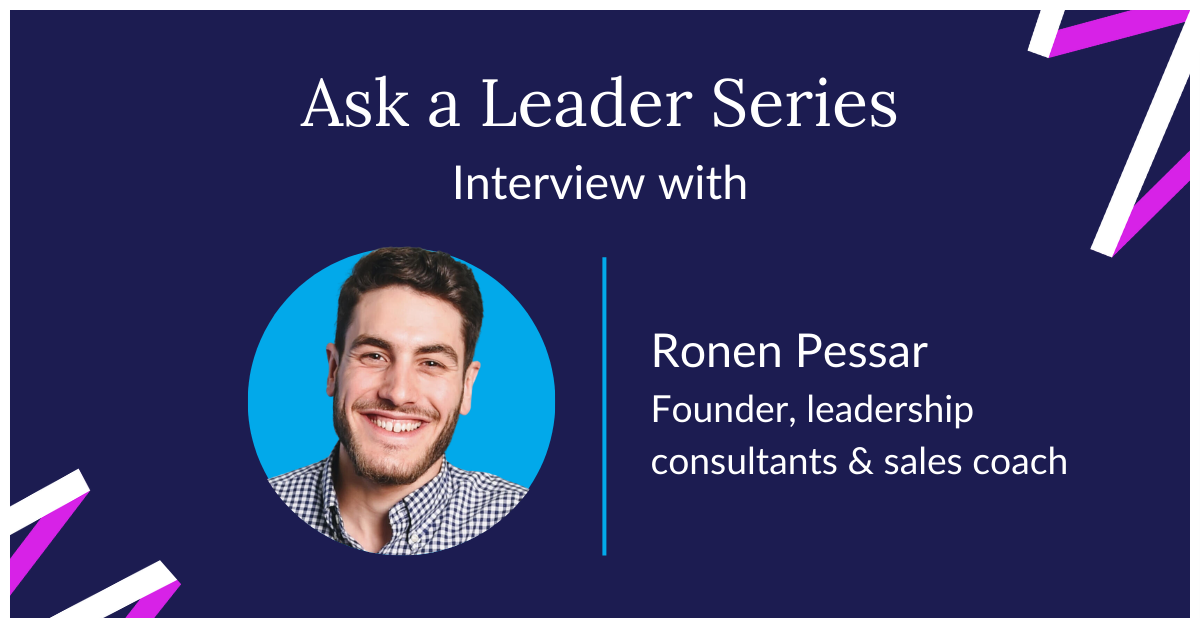In this exclusive interview with Ronen Pessar, founder, leadership consultant and sales coach, he shares common traits of top-performing SDRs, what makes a good sales leader, most common sales objections and how to overcome them, cold calling best practices, and his go-to cold call openers.
What are common traits among top-performing SDRs?
Ronen emphasizes the importance of a growth mindset, drawing on Carol Dweck's well-known concept. A growth mindset allows reps to identify their weaknesses and work on them with humility. This trait is so critical that Ronen considers it when interviewing candidates by probing their self-awareness with questions like, "What's the hardest truth you've had to face about yourself?"
Another vital trait is motivation that aligns with the daily responsibilities of the job. Ronen notes that while motivation can fluctuate, great leaders can cultivate it by connecting team efforts to a collective mission, which keeps the fire burning even through tough objections and moments.
Adaptability is also crucial, especially given that many SDRs work in the dynamic environment of startups. Ronen cites the fable "Who Moved My Cheese?" to highlight the value of being flexible and moving with the changing tides of the company.
Lastly, Ronen's favorite trait: "chutzpah," which translates to shameless audacity. This quality isn't about being disrespectful but about confidently challenging ideas to gain respect and establish peer-level communication with prospects.
In summary, top-performing SDRs share these standout qualities:
Growth mindset: They see challenges as opportunities to improve.
Self-awareness: They understand their weaknesses and work to overcome them.
Aligned motivation: Their drive is connected to the team's collective goals.
Adaptability: They can navigate and thrive in changing environments.
Chutzpah: They possess a respectful yet bold audacity that builds peer respect.
What makes a good sales leader?
Ronen delves into the heart of what makes a good sales leader by referencing Google's Project Aristotle and the pioneering work of Amy Edmondson on psychological safety. Here's the gist of his insights:
- Psychological safety: A key finding from Edmondson’s research is that top teams report their failures openly, creating a safe space for honesty.
- Culture of openness: Good sales leaders foster an environment where team members aren't afraid to share what's not working.
- The right kind of failure: Ronen notes that not all failures are equal. Leaders should encourage intelligent failures—the kind that leads to innovation and learning.
In short, a good sales leader makes their team feel comfortable sharing the good, the bad, and the ugly. This creates a space where people can learn fast, innovate, and push boundaries safely, which is super important in a world where AI and rapid change are the norms.
Most common sales objections and tips to overcome them
Ronen says there are are two main types of sales objections:
- Brush-off: They're not rejecting the product but the fact they're being called.
- Genuine objections: These are specific issues or concerns about what's being offered.
To get past initial resistance, he suggests changing the caller's tone of voice to something unexpected, which he calls a "pattern interruption." Ronen suggests using a warm and friendly tone for roles involving interpersonal skills, and a confident and sharp tone for more technical roles.
Here are some common sales objections that Ronen discussed during the interview with examples of how to overcome them:
Objection 1: "Can you email me? I'm busy."
Response 1: "Hey, look Rita. I'm really happy to email you, don't get me wrong. I'll send you 100 emails if it helps us talk, but I've been doing this a while. And I'm still waiting to hear back from all the people I've emailed. Would it be a terrible idea if instead we found 30 minutes on Monday, I have some time in the afternoon, or even Tuesday morning where we could chat a little bit further about this."
Objection 2: When they have a current solution
Response 2: "Oh, super happy to hear that you have that in place. Just one more question for you. When it comes to email copy, can you already guarantee that your team is going to get 15% reply rates?"
⬆️ This example demonstrates shifting the conversation to a new angle or problem area that the current product or service may not address, thereby opening a dialogue on how the salesperson’s offering could potentially offer additional value.
|
Related post: 21 Common Sales Objections (& How to Respond to Them)
|
Cold calling best practices
Ronen has some pretty neat tricks up his sleeve for cold calling. He suggests that standing up can work wonders for your energy levels.
He also recommends striking a superhero pose before dialing. It's all about hacking your brain into feeling confident.
And don't sweat it if you're hearing 'no' more than 'yes.' Ronen advises that we should actually aim for those rejections. It helps build up a sort of rejection-proof armor, and besides, if you're scoring a meeting from 1 out of 10 calls, you're actually on track.
Here are Ronen's key takeaways in a nutshell:
- Stand up to make those calls – it boosts your energy.
- Power posing can give you a confidence surge – a tip inspired by Amy Cuddy's research.
- Collect those 'no's like trophies – they mean you're trying.
- A 10% success rate is actually a win in cold calling, Ronen points out.
- Don't worry about what you can't control – focus on the things you can.
|
|
What’s your best cold call opener?
Ronen shares his unique take on cold call opening lines with a splash of humor and honesty. His famous "roll the dice" opener, where he literally tells the prospect that it's a cold call and asks if they want to roll the dice, is known for catching people off guard and getting a laugh.
His go-to cold call opener sounds like this: "Hey, it's Ronen. And this is a cold call. Do you want to roll the dice?"
When it comes to a more reliable approach, Ronen leans on a method from Sandler sales training, starting with a warm, friendly tone. He acknowledges the unwelcome nature of cold calls and asks for permission to proceed, allowing the prospect to feel in control.
Here’s what a permission-based cold call opener sounds like: "Hey [Prospect's Name], it's Ronen here. Hey look, nobody likes getting a cold call, especially not on a Wednesday afternoon. May I share why I'm calling, and then you can let me know if we should continue talking? Is that fair?"




